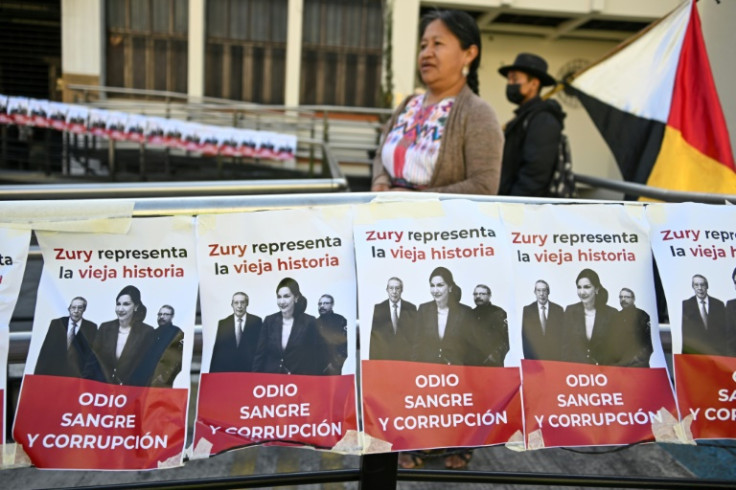Relatives Of Tainted Ex-leaders Vie For Guatemala Presidency

Campaigning opened Monday for Guatemala's June 25 presidential election with the daughter of a former dictator and the widow of a graft-accused ex-president leading the field.
The campaign is already mired in controversy, with questions around the eligibility of Zury Rios -- daughter of former strongman Efrain Rios Montt -- and the exclusion of Indigenous candidate Thelma Cabrera.
Some 9.3 million Guatemalans are eligible to cast a compulsory vote at a time the country is battling deep economic troubles and accusations the government is persecuting human rights and corruption prosecutors.
Nearly 60 percent of Guatemala's 17 million inhabitants live in poverty and the Central American country has one of the highest murder rates in the world.
Last week, protesters marched in Guatemala City against the candidacy of Rios, whose father took power in a coup d'etat and was in 2013 sentenced to 80 years in prison for the genocidal killing of Indigenous Guatemalans.
The sentence was later overturned and the retired general died in 2018, aged 91, as a retrial was under way.
Rios, 55, has had a long career in politics, mainly as a lawmaker. She came in fifth place in the 2015 presidential race.
Last week's protesters pointed to a constitutional prohibition against former coup leaders' relatives holding high office.
The same Supreme Electoral Tribunal (TSE) which overturned that prohibition, allowing the younger Rios to run, excluded Cabrera, 52, and her vice presidential running mate, former human rights lawyer Jordan Rodas, from the race.
It said Rodas was ineligible because of questionable accounting practices, which also excluded Cabrera, who refused to drop him from the ticket. Rodas denies the allegations.
For the NGO Guatemala Verifica, the exclusion meant the TSE was seeking to "eliminate the strongest parties and candidates."
The other frontrunner is two-time presidential runner-up Sandra Torres, 67, whose husband Alvaro Colom was arrested for fraud and embezzlement in 2018. He died in January.
Herself also investigated for corruption, but never convicted, Torres came in second in the last two election runoffs.
There are 20 presidential candidates in all but Rios and Torres lead the pack, according to opinion polls, with about a fifth of stated voter intent each.
Both women are running on promises to reduce violence, improve education and public health, and combat poverty.
Guatemalan presidents serve a four-year term with no option for successive reelection.
Candidate inscription closed Monday, marking the official launch of the campaign, according to TSE spokesman Luis Gerardo Ramirez.
Voters will also elect members of the legislature and mayors.
If no candidate garners more than 50 percent of the vote in June's first presidential round, there will be a runoff on August 27.
Guatemala has recently arrested a number of former prosecutors and members of a now defunct UN-backed entity called the CICIG that helped unearth several corruption scandals.
The United Nations in January voiced "deep concern" over what it called threats, harassment and reprisals faced by justice officials and human rights defenders in Guatemala.
© Copyright AFP {{Year}}. All rights reserved.





















